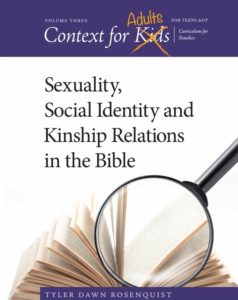Now Available! Context for Adults: Sexuality, Social Identity and Kinship Relations in the Bible
 Although it still falls under the umbrella of the “Context for Kids” curriculum series, this book ain’t for kids. I recommend it for older teens and up, but only with parental guidance. The first ten and last five chapters are G-rated and very valuable for any age group, and probably the most important material that I teach – on the ancient group social identity that, in and of itself, unravels many mysteries in the behavior of Bible people. The chapters on the inside, however, are a real mixed bag – not much different than the Bible itself. Like all my books, this is for families to go through together, as appropriate, and never to be simply handed to kids.
Although it still falls under the umbrella of the “Context for Kids” curriculum series, this book ain’t for kids. I recommend it for older teens and up, but only with parental guidance. The first ten and last five chapters are G-rated and very valuable for any age group, and probably the most important material that I teach – on the ancient group social identity that, in and of itself, unravels many mysteries in the behavior of Bible people. The chapters on the inside, however, are a real mixed bag – not much different than the Bible itself. Like all my books, this is for families to go through together, as appropriate, and never to be simply handed to kids.
What is this book about? Well, this is the book I wish I had available for me – the book that explains, from the ancient Near Eastern perspective, the sections of Scripture that make the Bible so hard to defend and support – not only to our kids, but also to our unbelieving friends and relatives. Marrying a rapist? Marrying female POW’s? Why are terrible subjects like bestiality, and incest even mentioned? Why did Peter refer to Lot as righteous?
Although these subjects seem strange to us, they were not strange in the ancient world that served as the context of the everyday lives of the Exodus generation. Some questions, like the marrying of a “rapist”, boil down to bad translations – but others are related to the ancient notion of what righteousness means, what behaviors were the norm in the outside world, and what it meant to be part of a group, instead of an individualistic, social dynamic. God was creating a new paradigm in a world driven mad with sin. Living in the aftermath of the Resurrection, we really have no appreciation for how bad things truly were before Messiah changed everything.
I am going to take you into the world of group-centered dynamics where you will learn a form of kinship relations that is foreign to the western world. I will introduce you to the horrifying realities of the laws of the ancient Near East. Life for the Patriarchs was akin to walking through a minefield of depravity and injustice, the likes of which we can barely imagine – but in order to understand and defend God’s laws, and answer the tough questions, the really good questions, we really need to know what the Biblical authors knew. It isn’t enough to shrug and say, “Well, I just know that God is good” when our lack of context makes Him look bad to the very people we were commanded to reach with His love. Remember – without a concrete salvation experience, we cannot simply expect people to ignore the stuff about the Bible that sometimes seems insanely disturbing. Compassion should compel us to seek out better answers – for unbelievers, our kids, and ourselves.
So, if you are tired of shrugging and saying, “Well, I just know that God is good,” I hope you will allow me to illuminate many of the Bible’s most uncomfortable subjects.
From the back cover:
Are you tired of being asked tough questions, both by kids and skeptics, about some of the terrible things in the Bible? Are you tired of not having real answers? Don’t you wish you understood why Bible people sometimes did terrible things?
No one is satisfied with pat answers like, “Well, I know God is good,” or “Jesus came to change all that.” If we truly believe that God is good and that Jesus is the exact image of the Father, then those answers won’t satisfy us – much less anyone else.
What if I told you that we can learn the answers to the hard questions by studying ancient Near Eastern law codes and sociology?
What if I told you that Western Christianity fundamentally misunderstands the meaning of words like righteous and has misconstrued concepts like kinship? What would you say if I told you that the ancients’ concept of family, loyalty, honor, shame, and community was completely different than ours is today?
What if, by understanding these ancient beliefs, you could provide concrete answers instead of platitudes to people’s questions? And what if by doing so you could offer hope and the reassurance that God is loving and good?
When people ask what kind of God would allow slavery, require women to marry their “rapists,” or tell parents to stone their children, wouldn’t you like to clear up their misconceptions instead of sidestepping the issues? Good questions deserve real answers, and that’s why I am here.
As I have explored Honor and Shame culture and ancient covenants in previous volumes, this curriculum will be dedicated to the subjects of ancient law, social identity, and kinship relations. This information is going to change forever the way you read your Bible. What you learn here will equip you to answer those “skeptics” whose only real crime is that they are honest about some of the situations in the Bible that are, or seem to be, very disturbing.